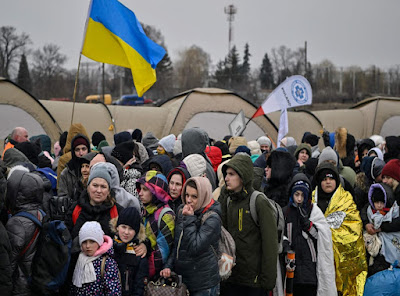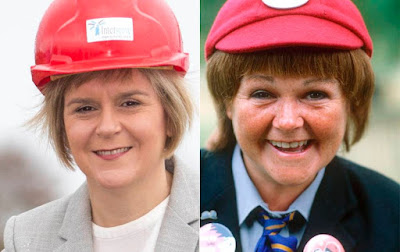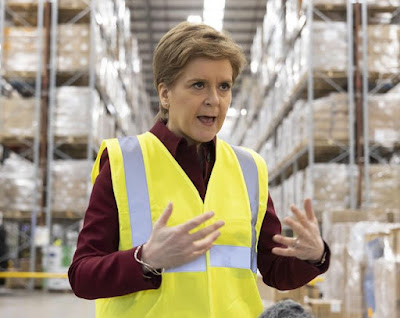The war between Russia and Ukraine is essentially
about different forms of nationalism. It is for this reason that it is relevant
to Scotland. This is why the SNP is trying to create a narrative which it hopes
will be helpful to its goal. After all Ukraine is the result of a successful
secession movement. But it is also the victim of secessionists trying to break
up Ukraine and also the victim of Russian nationalism attempting to unite independent
states which formerly were part of the USSR and the Russian Empire.
Russian nationalism takes a similar form to processes that led to the unification of both Germany and Italy in the nineteenth century. The formerly independent states that eventually became Germany and Italy were at least as linguistically diverse as Belarus and Ukraine today. Someone from the north of Italy will struggle to understand Sicilian more than a Russian will struggle to understand Ukrainian. Someone from Berlin will struggle to understand Bavarian.
German unification came about through force. Saxony is
now part of a united Germany because it lost the Battle of Königgrätz in 1866.
The wars of German unification were just as aggressive as the war in Ukraine
today. The justifications just as dubious. Russian nationalism therefore is not
essentially different from the forces of unification nationalism that shaped
the map of Europe in the nineteenth century.
We look on Italy and Germany today not as historically
unjustified, because their attempts at unification were successful. Peace
treaties were signed and places like Saxony accepted their loss of independence,
other states like Austria accepted their loss of territory. History views the
wars that led to German and Italian unification as inevitable even justified
and the process of unification as benign or even a good thing. Few Germans or
Italians regret that they live in a unified nation state.
Nationalism is dangerous however because there are
conflicting claims. Ukraine was allowed by the Soviet Union to become
independent. But the right that Ukraine has as a sovereign nation state to
maintain its territorial integrity and independence is incompatible with the
claims of Russian nationalism. When two sides have irreconcilable political goals,
war is frequently the result.
“War is simply the continuation of political
intercourse with the addition of other means”
If Russia had successfully invaded and conquered
Ukraine the result might have been similar to 1871 when Germany achieved its
goal of unification, but it looks now as if Ukrainian heroism will prevent this.
Ukraine will remain a sovereign independent state, but it may not be able to
maintain its territorial integrity. Russian forces may withdraw from most of
Ukraine, but it is less likely that they will withdraw from Crimea or the Donbas.
What might peace look like between Russia and Ukraine?
At the moment Russia has asserted that Crimea is part of Russia and that the Donbas
is independent from Ukraine. These places have de facto seceded from Ukraine,
but their secession is unrecognised by the West and most of the rest of the
world.
This is where the issue becomes of some importance for
Scotland? Does Ukraine have the right to prevent parts of its state seceding?
Unquestionably it does. It is for this reason that we haven’t recognised that
Crimea is legitimately part of Russia.
It doesn’t essentially matter whether or not the
majority of the people in Crimea or the Donbas want to leave Ukraine because
Ukraine legally has the right to maintain its territorial integrity.
But what if Ukraine makes peace with Russia and allows
the Donbas and Crimea to secede and become parts of Russia? This unquestionably
would be legal. Lots of boundaries in Europe have changed in history and peace treaties
have recognised these changes. But it would set a horrible precedent.
If Putin’s wars in 2014 and 2022 lead to Ukraine
permanently losing Crimea and the Donbas then secession movements in these places
would have succeeded and war would have been rewarded. Putin might be encouraged
to have another go later or some other country might try to achieve unification
with a territory it claims.
But it is going to be difficult if not impossible for
Ukraine to get back either the Donbas or Crimea. The West could maintain
sanctions and isolate Russia until these territories are restored, but this
will lead to a frozen conflict rather than peace and it will make war in the
future likely.
We are in a different situation in the United Kingdom.
No one thinks it likely that there will be war. But Irish nationalism’s attempt
to make Northern Ireland secede from the UK is essentially the same as Russian nationalism’s
attempt to create a united Russia. It is trying to unite people who it thinks
are really Irish even though they live in a separate state. Well, this is just
the same as Putin thinking that Ukrainians are really Russians.
Scottish nationalism is similarly comparable to the
people in the Donbas and Crimea attempting to leave Ukraine. The circumstances
are different. But nobody questions the right of Ukraine to maintain its
territorial integrity even if the majority of people in Donbas and Crimea
expressed their wish to leave in democratic elections.
But if Ukraine has the right to maintain its
territorial integrity against both the secession (Crimea, Donbas) and
unification (Russian) forms of nationalism, then the UK obviously has the same
right.
The UK just like Ukraine is a single nation state. It
is not a federation, still less a confederation, nor is it like the EU. It has
parts that happen to be called countries, but it is not a voluntary union any more
than Germany or Italy are voluntary unions.
The parts of the UK are called countries for
historical reasons just as for historical reasons the parts of the United
States are called states, but Texas is a state in a different way from which
the United States is a state and therefore Scotland is a country in a different
way from which the UK is a country. Crimea once was independent and it might
choose to think of itself as a country, but it is still part of Ukraine and has
no more right to leave because it formerly was independent or indeed because it
thinks of itself as country.
The United Kingdom has a different political tradition
from most countries in the world. While Ukraine would forbid an independence
referendum in Crimea, we granted one in Scotland. But this is a political
position that could change. It depends on political opinion in the whole of the
UK. The vast majority of Ukrainians would oppose the parts of Ukraine being
given the right to secede. This is why they are fighting a war. Public opinion
is different here.
The world looks differently on attempts by Ireland to
unify with Northern Ireland and the attempts by secessionists in Scotland to
leave the UK. But future events in Ukraine will change this. If Putin succeeds
in unifying Russia with Crimea and the Donbas, then international opinion may
look less favourably on both Irish and Scottish nationalism. If the world
continues to assert that the right to territorial integrity is paramount then
other countries might come to see the UK’s right to territorial integrity as
important to them. They won’t want a precedent to be set.
A peace treaty in Ukraine may well involve the UK
being involved in guaranteeing peace and security in Ukraine. But obviously the
UK cannot guarantee anything if it lost Northern Ireland, Scotland and perhaps
Wales. In that case there would be no UK, because there would be nothing left
to unite.
The war in Ukraine shows the danger of both the
secession and unification forms of nationalism. But Ukraine itself cannot be
accused of Ukrainian nationalism for defending its territorial integrity against
these nationalisms. So too it is absurd to describe British people who wish to
maintain the territorial integrity of the UK as nationalists. The Ukrainians
fighting so bravely are patriots. This is the word for everyone who wants to keep
his country intact.
Her mask shows she supports the territorial integrity of Ukraine. Why then does she not support the territorial integrity of the UK?







